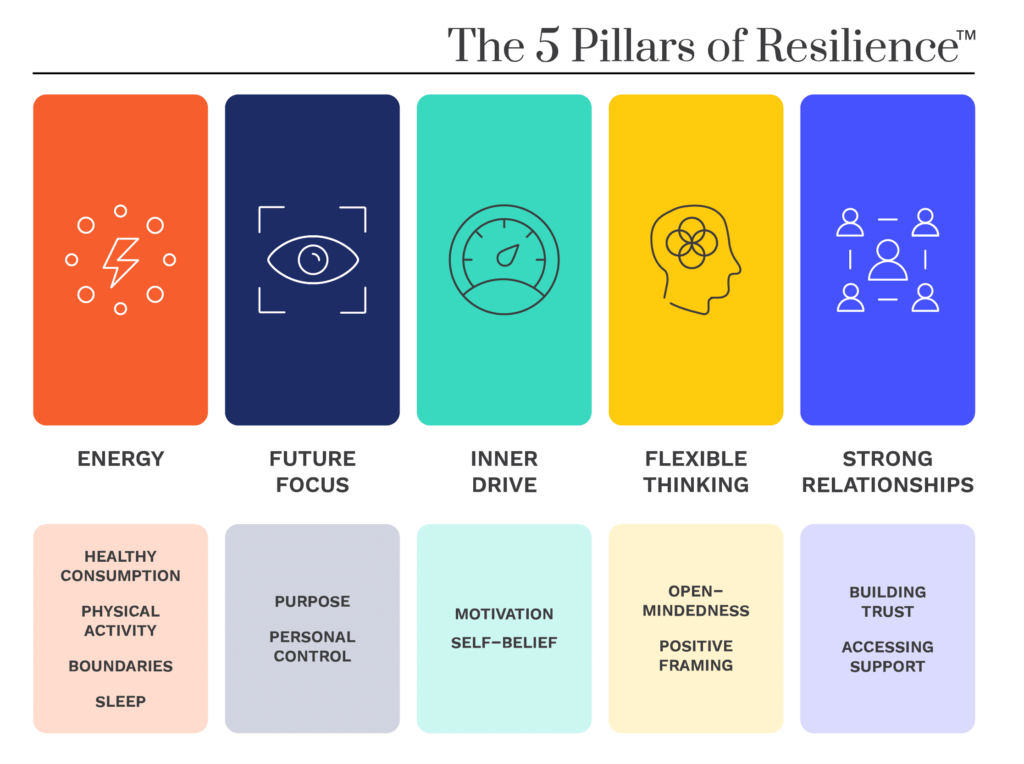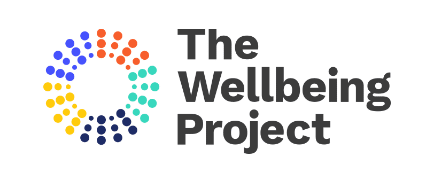30 July 2024
The 5 Pillars of Resilience
The 5 Pillars of Resilience is a robustly evidenced model for developing resilience in the workplace
Why is employee resilience important?
Resilience refers to our capacity to steer through adversities, stress, and challenges. It enables us to bounce back from setbacks, adopt a growth mindset, and maintain positive mental health through turbulent times. Importantly, resilience is one of the most critical skills in the workplace today.
Over the past year, 91% of UK workers experienced extreme stress levels, with 1 in 5 needing to take time off due to poor mental health. This resulted in a staggering 18 million working days lost, costing the economy £102 billion per year. There’s no single cause, but ongoing instability, economic pressures, and work volume contribute significantly.
Resilience doesn’t make us immune to these challenges, but it enables us to handle them while proactively maintaining our mental health and performance. This benefits both individuals and organisations because a resilient workforce is one that sees opportunity where others see challenge, driving ongoing success and innovation.
To help you gain a deeper understanding of workplace resilience, The Wellbeing Project has developed a robust model that breaks resilience down into simple, relatable and measurable concepts. This model is known as The 5 Pillars of Resilience.

The Workforce Resilience Guide
Discover how to build the resilience of your workforce.
What are the 5 Pillars of Resilience?

The 5 Pillars of Resilience is a scientifically validated, evidence-based model for understanding resilience. It is a holistic framework that includes the physical, emotional, social and mental aspects of resilience.
Pillar 1 – Energy
The Energy Pillar is about sustaining and renewing physical energy. Taking care of your physical health and energy set a strong foundation for physical and mental resilience. Energy management strategies include regular movement, adequate sleep, nutrition, and mindfulness. Combining these strategies ensures you have adequate energy to manage stressors and maintain quality of life.
Pillar 2 – Future Focus
Future focus is all about knowing where you want to go and how to get there. This key pillar is about having a sense of purpose and direction. These will enable you to navigate stressful situations with less anxiety and uncertainty about the future. So, if you feel suck and can’t see a way out, Future Focus will help you find a new direction.
Pillar 3 – Inner Drive
Sometimes, even when we are clear about what we want, we might not believe we can get there. Inner Drive is about self-belief, confidence and motivation. It is much easier to balance stress levels and persevere when we feel confident in ourselves and our abilities
Pillar 4 – Flexible Thinking
When we are in problem mode we tend to see things as very black and white. Flexible Thinking helps us think outside the box and identify new ideas and possibilities. This pillar is crucial in navigating ongoing change and finding innovative solutions to problems.
Pillar 5 – Strong Relationships
A common misconception is that resilient people are fiercely independent. Resilient people have positive relationships and great support networks through their friends, family, and colleagues. They are aware of others’ feelings and can be open about the challenges in their lives. Since they fully grasp the importance of healthy relationships, they work hard to maintain them.
How do the 5 Pillars of Resilience link together?
Energy is the foundation stone for resilience. Future Focus is about ensuring that you are not stuck in the problems of the present and that you are looking forward with realistic optimism. Inner Drive is about motivation, confidence and self-belief. Flexible Thinking enables you to have lots of different options and routes to get you there, and Strong Relationships ensure you have the support you need along the way.
How do you measure The 5 Pillars of Resilience?
We all have our own resilience strengths and development areas. To give your people insight into their own resilience profile, we developed the Wraw psychometric tool. Wraw measures resilience across The 5 Pillars of Resilience, and produces a range of reports for individual employees, teams and leaders. This insight is an invaluable resource for effective planning so that employees can capitalise on their resilience strengths, and take targeted action to develop additional skills.

Author Bio: Sandra Ordel is a Senior Business Psychologist specialising in workforce resilience and neuropsychology. She supports organisations worldwide to build resilient teams and cultures of healthy performance.
Our free guide to building the resilience of your workforce. Download your copy today.

Our free guide to building the resilience of your workforce. Download your copy today.









